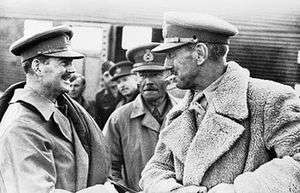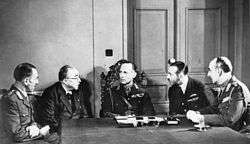Michael Gambier-Parry
Major-General Michael Denman Gambier-Parry MC DL (21 August 1891 – 30 April 1976) was a senior British Army officer who briefly commanded the 2nd Armoured Division during the Western Desert Campaign of the Second World War.
Michael Gambier-Parry | |
|---|---|
 Major-General Michael Gambier-Parry (right), Lieutenant-General Philip Neame (centre) and Brigadier John Combe (left), following their capture in North Africa. | |
| Born | 21 August 1891 |
| Died | 30 April 1976 (aged 84) Sussex, England |
| Allegiance | |
| Service/ | |
| Years of service | 1911–1944 |
| Rank | Major-General |
| Unit | Royal Welch Fusiliers Royal Tank Regiment |
| Commands held | 1st Malaya Infantry Brigade 2nd Armoured Division |
| Awards | Military Cross |
Early life and family
The Gambier-Parrys of Highnam Court, Gloucestershire were an artistic and military family (see Thomas Gambier Parry and the latter's son, eminent composer Sir Hubert Parry). His uncle Ernest Gambier-Parry was a major in the army sent to Egypt to avenge the death of General Gordon, and wrote a book (Suakin, 1885) about his experiences.[1] Michael's father was architect Sidney Gambier-Parry.[2]
Military career

Educated at Eton College, Gambier-Parry entered the Royal Military College, Sandhurst and was commissioned, a Captain into the Royal Welch Fusiliers in 1911.[3] He served in the First World War in France (awarded the Military Cross) and in the Gallipoli Campaign and then in Mesopotamia.[3] He attended the Staff College, Camberley from 1923 to 1924, and transferred to the Royal Tank Corps in 1924 and then served as a General Staff Officer at the War Office before becoming Commander of the Malaya Infantry Brigade in 1938.[3]
He served in the Second World War as Head of the British Military Mission to Greece in 1940, during the Greco-Italian War, and then as General Officer Commanding 2nd Armoured Division[4] in North Africa before becoming a Prisoner of war in 1941.[3]
He was captured by the Italians along with Brigadier Vaughan at Mechili in April 1941. Arriving in Villa Orsini near Sulmona with Philip Neame, Richard O'Connor, John Combe and George Younghusband, he was sent to Castello de Vincigliata PG12 near Florence the same year. As Carton de Wiart wrote of him "…he was also a most gifted man, made delightful sketches, was a first class 'forger' – which could no doubt earn him a steady income in the underworld".[5][6] Known as 'GP', he was a knowledgeable musician, "and led the choir in our church services on Sunday".[7][8] In September 1943 he escaped with the other officers and after various adventures arrived in Rome[9] where he had obtained sanctuary in a convent, till the allies arrived. He retired in 1944.[3]
Postwar
In retirement he lived at the Weavers House[10] in Castle Combe near Chippenham and House Forest Gate in Poundgate near Crowborough[11] and became Deputy Lieutenant of Wiltshire.[12]
References
- The Times, OBIT. 17 April 1936
- Ranieval, The Marquis of Ruvigny and (1 May 2013). The Plantagenet Roll of the Blood Royal: The Mortimer-Percy Volume. Heritage Books. p. 166. ISBN 978-0-7884-1872-3.
- Liddell Hart Centre for Military Archives
- Generals.dk
- Carton de Wiart p 194
- Hargest p113, 114
- Neame p304
- Fleming, p.109-112
- MRD Foot, p167
- Historic England. "Weavers House (1022890)". National Heritage List for England. Retrieved 19 June 2020.
- Who Was Who (1971–1980). London: A & C Black, 1981. ISBN 978-0-7136-2176-1, p. 286.
- "No. 39661". The London Gazette. 3 October 1952. p. 5214.
Bibliography
- De Wiart, Carton (2007). Happy Odyssey. Pen & Sword Books. ISBN 1-84415-539-0.
- Fleming, Brian (2012). The Vatican Pimpernel: The World War II Exploits of the Monsignor Who Saved Over 6,500 Lives. Skyhorse Publishing. ISBN 978-1616087029.
- Foot, M. R. D.; Langley, J. M. (1979). MI9 Escape & Evasion 1939-45. The Bodley Head. ISBN 9781849541312.
- Hargest, James (1945). Farewell Campo 12. Michael Joseph.
- Neame, Philip (1947). Playing with Strife, The Autobiography of a Soldier, Lt-Gen. Sir Philip Neame, V.C., K.B.E., C.B., D.S.O. George G Harrap & Co. Ltd.
- Ranfurly, Hermione (1994). To War with Whitaker. William Heinemann. ISBN 0-434-00224-0.
- Smart, Nick (2005). Biographical Dictionary of British Generals of the Second World War. Barnesley: Pen & Sword. ISBN 1844150496.
| Military offices | ||
|---|---|---|
| Preceded by Justice Tilly |
GOC 2nd Armoured Division February – April 1941 |
Succeeded by Post disbanded |